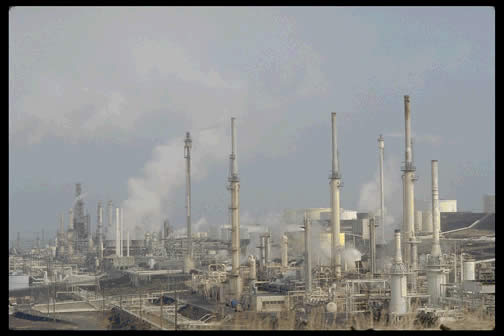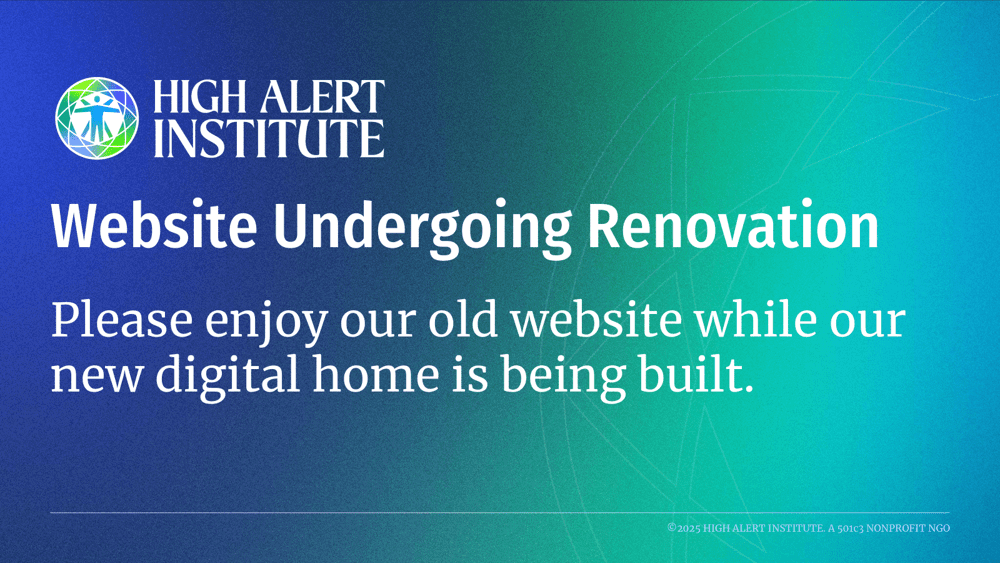High Alert Institute
Dilution is the Solution to COVID & Other Pollution

Even before the coronavirus pandemic struck, a landmark report from the World Health Organization (WHO) on Social Determinants of Health (SDoHs) cited poor air quality as one of the leading non-medical factors that impact health. Basically, Indoor Air Quality (IAQ) was already on the minds of business owners, COVID-19 has served to shine a spotlight on air quality and ventilation like never before. What is the “best bang for a business’s buck” in order to maximize air quality and reduce the likelihood of COVID, or another virus from striking someone ill in the workplace?
Wearing masks, social distancing, and cleaning and sanitizing surfaces are all fine and well and a good start to improving workplace hygiene. But they are only that, a start. The bigger problem lies in the air we breathe while we’re at work for hours on end. Thus, the focus needs to be on airborne transmission more than on cleanliness.
Studies by the Environmental Protection Agency (EPA), American Society of Heating, Refrigerating and Air Conditioning Engineers (ASHRAE) and others have shown that the coronavirus can remain active in an indoor environment for up to 72 hours. This means that, without truly effective ventilation, the business may simply be recirculating air that contains the COVID virus rather than greatly reducing or eliminating it!
This article will discuss some of the supposed answers to IAQ, especially in light of COVID, when in reality only one of them is really a “solution” to the problem. Let’s start with what doesn’t work all that well:
* HVAC filters;
* Ozone generators; and
* UV lighting products.
HVAC Filters & MERV Ratings
Heating, Ventilation and Air Conditioning (HVAC) filters remove mold, dust, allergens, and other pollutants from the air, including the COVID virus, but they are far from foolproof. In general terms, some estimates cite HVAC filters as being no more than 90 percent effective at removing the airborne transmission of pollutants.
It’s important to discuss MERV, otherwise known as Minimum Efficiency Reporting Value, which is used to evaluate the efficiency of an air filter based on how effective it is at catching particles of various sizes. The higher the MERV rating, the greater the air filtration capabilities of a particular filter. MERV ratings range from 1 to 20, with 1 being the lowest and 20 being the highest. MERV 16-20 filters are usually found in hospitals. Typical home and small business air filters range between MERV 5 and 8. The drawback is, the higher the MERV rating, the denser the filter needs to be, but it is difficult for an HVAC system to blow air through a filter that thick. Filters rated at MERV 13 or higher are required to remove viruses and other airborne pathogens. It may be too expensive and time consuming to retro fit a small business HVAC system to handle such high filtration.
Ozone Generators
Adding an ozone generator to an existing HVAC system is not recommended by the Centers for Disease Control and Prevention (CDC), EPA or ASHRAE. At lower levels, ozone is a powerful oxidant with many industrial and consumer uses. The problem is that the amount of ozone required to sanitize a building may actually injure occupants because ozone damages mucous and respiratory issues, making it a serious respiratory hazard. Diluting the amount of ozone doesn’t work either – in fact, the DOE and EPA report this actually makes IAQ worse. Simply put, ozone generators swap one problem (coronavirus exposure) for another (excess ozone).
UV Lighting Products
Ultraviolet (UV) lighting products is a familiar technology that has been proven to work against viruses. The problem here is that powerful UV lamps that are neither practical nor inexpensive are needed to be effective, especially if the building is large, and simple add-ons (installing UV lights into an air duct or air handler) are NOT enough. So, what is left?
Dilutional Ventilation
As mentioned earlier, the biggest problem lies in the air itself. Research is revealing that a person can lessen the risk of COVID infection by simply reducing the amount of virus that is floating around in the air.
It has been discovered that if one inhales one COVID virus, infection will not result. Two viruses? Again, no. 100,000? Now you are talking about risk! So, if the business owner can hold down concentrations, he can decrease the odds of contracting the virus. This is referred to as relative risk reduction and it is best accomplished by diluting contaminated air with fresh outdoor air.
The only true solution are SMART whole building ventilation systems. Such systems use indoor and outdoor SMART sensors to determine when outdoor air quality is superior to indoor air quality. SMART whole building ventilation systems provide fresh air from outside the building to displace contaminated air from inside the building, thus removing airborne viruses and other indoor pollutants. This process, known as “dilutional ventilation” essential in controlling the spread of airborne illnesses like COVID-19.
The Solution to (Indoor) Pollution is Dilution
The old adage, “the simple solution is often the best solution” definitely applies to the problem of indoor air contamination and airborne illnesses… Fresh Air!
SMART whole building ventilation systems provide a safe, energy efficient, cost effective, automated approach to providing that simple solution.
High Alert Institute
4800 Ben Hill Trail
Lake Wales, FL 33898
Office: 863.696.8090
FAX: 407.434.0804
EIN: 27-5078437
Info@HighAlertInstitute.org
Privacy Policy
Cookie Policy
Terms of Use
Disclaimers
Get Your Data
Shipping Policy
Message Us
Transparency
Registrations
Do Not Sell Info
Return Policy
A COPY OF THE OFFICIAL REGISTRATION AND FINANCIAL INFORMATION MAY BE OBTAINED FROM THE DIVISION OF CONSUMER SERVICES BY CALLING TOLL-FREE, WITHIN THE STATE, 1-800-435-7352 (800-HELP-FLA), OR VISITING www.FloridaConsumerHelp.com. REGISTRATION DOES NOT IMPLY ENDORSEMENT, APPROVAL, OR RECOMMENDATION BY THE STATE. Florida Registration #CH68959
REGISTRATION WITH A STATE AGENCY DOES NOT CONSTITUTE OR IMPLY ENDORSEMENT, APPROVAL OR RECOMMENDATION BY THAT STATE.










